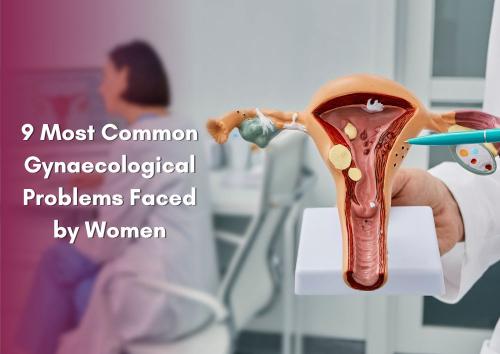9 Most Common Gynaecological Problems Faced by Women - Miracles Apollo Cradle

Gynecological problems have become a major concern, impacting millions of women worldwide. These conditions not only affect women's physical health but also have significant implications for their emotional well-being.
A study by NOH reveals a particularly alarming prevalence of gynecological diseases among rural Indian women. Shockingly, the research indicates that 92% of rural women were found to be suffering from one or more gynecological or sexual diseases, with an average of 3.6 diseases per woman. It is also revealed that young Indian women with sedentary lifestyles face major gynecological issues.
Therefore, understanding the common gynecological problems experienced by women is important for maintaining overall health.
A regular visit to gynaecologists helps in better reproductive health. So consult with the best gynecologist near you for proper diagnosis and treatment, in case you notice uncommon symptoms. The expert team of the best gynaecologists in Gurgaon at Miracles Apollo Cradle is here to help you ensure better reproductive and sexual health.
In this blog post, we will discuss nine of the most prevalent gynecological problems. By familiarizing with the signs, symptoms, and risk factors associated with these common conditions, women can proactively manage their health through timely treatment. Furthermore, open discussions about these concerns can contribute to reducing stress, combating stigma, and taking necessary steps to address these problems.
The 9 Most Common Gynecological Problems Faced by Women:
Menstrual Disorders: Menstrual disorders encompass a range of issues affecting the frequency, duration, and severity of periods. These can include irregular periods, heavy bleeding (menorrhagia), or painful periods (dysmenorrhea).
Urinary Tract Infections (UTIs): UTIs occur when bacteria enter the urinary tract, leading to symptoms like frequent urination, burning sensation during urination, and cloudy or bloody urine. Women are more susceptible due to the shorter length of the urethra.
Pelvic Inflammatory Disease (PID): PID is an infection of the female reproductive organs, often caused by sexually transmitted bacteria like chlamydia or gonorrhea. Symptoms include pelvic pain, abnormal vaginal discharge, painful urination, and fever. If left untreated, it can lead to severe complications like infertility.
Polycystic Ovary Syndrome (PCOS): PCOS is a hormonal disorder characterized by irregular periods, excess androgen levels, and ovarian cysts. It may lead to weight gain, acne, hair thinning, and fertility issues. Treatment involves lifestyle changes, medication, and sometimes fertility treatments.
Fibroids: Fibroids are non-cancerous growths in the uterus, varying in size. Larger fibroids can cause heavy periods, pelvic pain, frequent urination, and discomfort during intercourse. Treatment options for fibroids may range from medication to surgery.
Endometriosis: Endometriosis occurs when tissue similar to the lining of the uterus grows outside the uterus, causing severe menstrual cramps, pelvic pain, painful intercourse, and fertility problems.
Yeast Infections: Caused by an overgrowth of yeast in the vagina, resulting in itching, burning, and abnormal discharge. Factors like hormonal changes, antibiotic use, and weakened immune systems can contribute to their occurrence.
Vaginal Prolapse: This occurs when the muscles and tissues supporting the uterus, bladder, or rectum weaken, causing them to bulge into the vagina. Symptoms include pelvic pressure, urinary incontinence, and difficulty with bowel movements. Treatment options include pelvic floor exercises and surgery.
Cervical Dysplasia: Abnormal changes in the cells of the cervix caused by the human papillomavirus (HPV). If left untreated, it can progress to cervical cancer. Detection through Pap smears and treatment may involve close monitoring, removal of abnormal cells, or HPV vaccination.
Conclusion:
Being aware of the common gynecological diseases allows women to take charge of their health. Regular screenings, maintaining good hygiene, practicing safe sex, and seeking timely medical advice for any concerning symptoms are important steps in preventing and managing these problems. Remember, the gynecologist provides support and guidance and prepares an appropriate treatment plan tailored to your individual needs. Staying informed can prioritize their reproductive health and overall well-being, empowering women to make informed decisions about their bodies.
If you are experiencing symptoms related to any gynecological problem, feel free to contact the best female gynae near you at Miracles Healthcare, Gurgaon, and take the first step towards a healthier you. schedule an appointment for your next gynecological check-up today.
Post Your Ad Here





Comments